- Home
- Tim Powers
Forced Perspectives Page 7
Forced Perspectives Read online
Page 7
Vickery sighed. “True.” Absently, watching the traffic, he said, “He was great in Doctor Zhivago.”
Castine just muttered, “She was talking about me!”
“Look,” Vickery said, “I’m going to reconnoiter, at my place in Barstow. You can come along, or I can take you back to the airport.”
She rolled down the window and tossed the keyring and fob out, and pocketed the key. “That probably wasn’t it, was it? The key fob?”
“Probably not. But it was a good idea to get rid of it anyway. It wouldn’t hurt to get you a whole fresh set of clothes, from the skin out, though that might not help either.”
“You really think they can still track us?” she said, rolling the window back up. “Or specifically me?”
“God knows. With luck their method isn’t very long-range, whatever it is. And Barstow’s separated from L.A. by a twelve-thousand-foot height of rock.” When she gave him a haggard, incredulous look, he explained, “The Cajon Pass is four-thousand foot elevation, and the plain-old curvature of the earth adds another eight or nine thousand feet to that. And the curvature is shallow at either end obviously, but from here to Barstow it’s a hundred and fourteen miles wide.”
“Let’s go to Barstow. Fast.”
“Are you sure? The airport’s—”
“I said Barstow! I—dammit, my flight’s not till tomorrow, I told you.”
He just nodded. And in spite of his concern for her, he was glad she was staying. Last year, when she volunteered to accompany him in a terrible-odds dive into the Labyrinth afterworld, old Isaac Laquedem had told Vickery, You’ll need help. Respect her choice.
“Okay,” he said finally, shifting to the left lane to pass a slow-moving bus. “I’m glad.” Then he added, diffidently, “We do have to make a slight detour on the way. To, uh, Hollywood Boulevard.”
“What?” She slapped the dashboard. “Why, for God’s sake? Just drive straight out of here to Barstow, right now!”
“I think we need to find out about that old wrecked house that’s been pre-empting our usual echo vision. Why it’s closer, and later in that day, every time we see it. I can’t believe it’s a coincidence that it started happening right before these guys decided to grab us. There’s—”
“Grab you. With the baby carriage.”
He waved a hand impatiently. “I’m part of us. There’s somebody we need to consult.”
“Who, that Laquedem guy? You said you couldn’t find him.”
“No. Um—a superhero, actually.”
Castine had been craning her neck to look behind them, but now she flopped back in her seat again and closed her eyes. “You’re all I’ve got,” she said. “You’re not going crazy, are you? Superheroes, curvature of the earth?” Now she was giving him a worried look. “Say something sane.”
He smiled bleakly, his eyes on the cars ahead. “You and I are not normal people.”
“Huh.” She shook her head. “That’s not sane, that’s just true.”
“I’m going to catch the 110 north, up here. If you want to think sane thoughts, you should probably close your eyes again.”
It had been from a spot on the northbound 110 that Castine and Vickery had exited the real world last year, and found themselves in the nightmare Labyrinth afterworld.
She rubbed both hands over her face, and pushed her hair back and exhaled. “Oh, I remember,” she said. For a while she just swayed in her seat as Vickery swerved from lane to lane, passing slower vehicles, and she might have been thinking about their time in that savagely counter-rational world. “Do you still go to church?” she said finally. “Latin Mass?”
“They don’t have Latin Mass in Barstow, but yes, I still make it to Mass on Sundays. I went yesterday.” He spared her a sideways glance. “Last year, when it was all over, you told me you got a rosary. Do you still have it?”
“No. No, I moved to an apartment in Gaithersburg, and it must have got lost.”
“Ah.”
She quickly went on, “Do you think that guy, your Omar Sharif, is really with the Egyptian Antiquities Patrol, or whatever it was? It’s weird he just told us to get out of town.”
“He’s really from Egypt, at least,” said Vickery, “that’s a Masri Arabic accent. What was it, ‘an artifact that was negligently curated’?”
“‘Long ago,’” agreed Castine. “I got the idea he means to destroy it. Do you suppose he was following us too?”
“My impression was that he was monitoring the other crowd, and stepped in quick to stop Red Suspenders from shooting you. You’ve still got his gun, I trust.”
“You were pretty quick there yourself, especially just coming out of a vision. Yes.” She pulled the little gun out of her jacket pocket and held it in her lap. “How soon till we’re on the 110?”
“A few more miles yet. Say ten minutes.”
“I might shut my eyes when we drive by that spot.” She stretched and yawned, and Vickery knew it was a yawn of tension rather than fatigue. “So are we allies again? Like last year?”
“Looks like it.”
“Friends, even, as I recall.” She found the magazine release button on the gun and popped the magazine out, then pulled the slide back, ejecting a .380 round. “I didn’t really lose the rosary,” she said, staring down at the gun as she let the slide snap back. “I’ve even been to Mass, a couple of times.” She pulled the trigger, and with a click some part of the gun flew out onto the floor.
She bent down and picked up a tiny metal rod, and held it out on her palm.
Vickery glanced at it. “The firing pin. I guess you weren’t supposed to dry-fire it. Never mind, I’ve got a couple of spare guns at home.”
She dropped the firing pin in the ashtray, and seemed relieved that the gun had changed the subject.
Vickery parked in a lot off Highland Avenue, a block south of Hollywood Boulevard, and he and Castine walked up to the crowded black sidewalk with its inset pink stars, and paused in the recessed entry of a store called Souvenirs of Hollywood. A cold wind was blowing straight down the boulevard from the west, and Castine pulled her jacket tighter and gripped her elbows.
“She’ll probably be out in front of the Chinese Theater, across the street,” Vickery said. Castine still hadn’t asked, so he explained, “The person we’re looking for is one of the costumed superheroes that tourists pay to have their picture taken with.”
Castine rolled her eyes but didn’t say anything.
The traffic light ahead of them switched from red to the green silhouette of a walking man, and masses of pedestrians in bright T-shirts or tank tops or grimy overcoats stepped out onto the pavement, moving simultaneously straight ahead across Hollywood Boulevard and to the right across Highland, and even diagonally to the far corner, since the crosswalks at this intersection formed a big square with an X in the middle, and all motor traffic faced red lights. Vickery and Castine moved with the northbound stream of the crowd, glancing cautiously around at the brightly dressed tourists and bearded street lunatics jostling them, and on the sunny north sidewalk Castine hurried out of the crowd to stand beside a wide window in the shade under an awning. Over the awning, Vickery had noticed tall letters on a higher row of windows spelling out live your life.
Castine had seen it too. “I’d like to live my life,” she said crossly. “We should have picked a different city to meet up in. Does everywhere in L.A. smell like marijuana?” She glanced left and right at the bobbing heads of the people moving in conflicting eddies in both directions on the sidewalk in front of them.
More quietly, she asked, “Do you think any of these are ghosts?”
“Among all these—sure, a few, though not as many as there would have been last year, before you and I closed the afterworld conduit.” He looked away from the rocking parade of now-questionable profiles to look at her. “I imagine there’s one or two who’ll soon spin away to nothing, which will startle any tourists who’re able see them. But the ones who attached themselves to
us then are gone.”
She tugged the cuffs of her jacket and pulled the bill of her Hollywood baseball cap further down. “I’d like to get home without picking up any new ones.”
“Right. We shouldn’t hold still anyway, in case everybody’s following our trail of breadcrumbs or whatever. Let’s see if we can find Supergirl.”
“Supergirl.” Castine’s voice was flat.
Vickery just nodded and took her arm. Rejoining the pedestrian stream, he led the way west along the broad, glittering black sidewalk, past curbside evangelists and pirated-CD sellers and plain beggars, choosing paths where the crowd ahead opened up for a moment, and soon they stepped out of the flux into the more static crowd in the Chinese Theater forecourt. Here the stiller air smelled of car exhaust and sunblock and chocolate from the Ghirardelli’s ice cream parlor on the other side of the boulevard.
A Captain Jack Sparrow, in full pirate costume and beaded beard, was standing between a couple of girls while an older woman took their picture with a phone, and when the tourists had hurried off toward a towering yellow Transformer figure, Vickery caught the Sparrow’s eye and held up a palm with a twenty-dollar bill crimped in it.
“Not a picture,” Vickery told him. “I’m looking for Supergirl.”
“Got a couple of such, mate,” said the Jack Sparrow.
“I mean—” Vickery paused; Rachel Voss might not want her name known to just any superhero on the boulevard. “She used to be Wonder Woman, but she was really too short for that.”
The Jack Sparrow nodded and reached out and took the bill. “She was over by the Ghirardelli a few minutes ago. Can’t have got too far.”
Vickery nodded and took Castine’s elbow again as he eased and sidestepped back out to the sidewalk. As they pushed their way through the crowd to the right, toward a crosswalk, she leaned in close to him to be heard over the multilingual babble around them.
“Supergirl?” she said again, more insistently.
“When I was an L.A. cop,” he said, “she was what they call a CRI, Confidential Reliable Informant. You’re supposed to register all your CRIs with a central database, but I kept a few of them secret, and she was one of those. She was very good with some ATM fraud cases I handled, but she was always—”
He paused while they separated around a Captain America.
“She was always,” he went on when they had rejoined on the far side, “telling me about occult activity in Hollywood. When I was a cop I didn’t pay much attention to that stuff, but last year I looked her up because I needed to get in touch with somebody who could allegedly talk to ghosts.”
“Laquedem.”
“Right,” he said, pausing at the crosswalk. “She steered me to him. Of all my old contacts, she’s likeliest to know who to ask about our haunted house visions.”
At the curb below a towering Madame Tussaud’s wax museum sign, a man was hunched over a smoking grill, turning browned bratwursts and sliding them into split rolls.
Castine nodded in that direction. “I once thought we were going to get lunch at that deli.”
The light turned green, and Vickery stepped into the street. “You had a tamale,” he said. “And I’ve got stuff in Barstow.”
“Stuff,” she said, falling into step beside him. “But you’re right, we shouldn’t slow down any more than we—maybe—have to.”
“There’s a good chance that Rachel’s worth the delay,” he said, standing on tip-toe to scan the crowd to the east. “I just wish she were taller.”
They had sidled and edged their way past the ornate foyer of the El Capitan Theater when someone tapped Vickery on the shoulder, and when he quickly turned around he saw the short, blonde figure of Supergirl, still trim and fit-looking in her red and blue Krypton suit.
“I think you’re Herbert Woods,” she said, using his nearly forgotten real name. She had stepped back, apparently leaving herself room to duck away if he was not.
“Hi, Rachel,” he said. He pulled Castine back and said, “This is Ingrid, a friend of mine.”
Rachel nodded politely. “Jack Sparrow sent a relay hand-jive signal that somebody was looking for me and coming this way, so I was waiting behind the box office here to see who it was. You’re lucky I recognized you again—a beard now? And where have you been? I’ve heard some weird stories.”
“Out of town,” he said. “Is Supergirl thirsty?”
“What do you think? It’s got to be after four, Boardner’s should be open.”
The crowd thinned out when they had walked the two blocks east to Cherokee Avenue, and Rachel was able to stop explaining to tourists that she was on a break and not open to posing for photographs. Vickery led the way around the corner and across the narrower street, and as he held open the door of Boardner’s he looked back and scanned the 180-degree view, and sighed with relief to see no sign of pursuers or watchers. He stepped inside after his two companions.
The interior was dim, lit mainly by the glow of blue lights under the glass shelves behind the bar, but Rachel led the way to a booth at the back. Vickery and Castine sat down on one side, facing Rachel.
“I bet,” Rachel began, then paused when a waitress stopped at their booth to take drink orders—a large Coke for Castine, a Coors beer for Vickery, and a sidecar for Rachel; “I bet,” she went on when the waitress had moved away, “you’re the woman this guy is supposed to have gone to Hell with!”
Castine looked at Vickery, who nodded. “Yes,” she said.
“I’d like to hear that story sometime,” said Rachel, scratching at her scalp under the blonde wig. “I heard you flew out in a hot-air balloon.”
“A hang-glider, actually,” said Vickery. “I’ll tell you about it another time. Right now we need a pen and paper.”
Castine slid the billfold from her inner jacket pocket and unclipped a pen from one side. “You can draw on the back of the rental contract for the Honda,” she said, pulling that free. “I’m afraid I’ll never return it.”
“Okay,” said Vickery, beginning to sketch on the back side of the stiff paper, “we’d like you to ask around among your witchy contacts, Rachel, to see if—”
Castine was watching him draw. “Leave room for two gables on the roof,” she interjected.
“Oh yeah,” said Vickery, nodding.
The drinks arrived, and he paused to take a long sip of the cold beer. “I think I’d be wise to have another of these,” he told the waitress.
When she had smiled and nodded and withdrawn, he went on, “Ask your people if they know anything about a house that looks like this.” He inked in the ground floor verandah, tilted and partly sunk in the ground on the right side. “This is sand,” he said, writing the word below. “And the whole building is dark—brown or gray.” He drew wavy lines behind the drawing of the three-story house, then decided that they just looked like smoke, and wrote “dirt slope behind the house” to make it clear.
Rachel put down her drink and craned her neck to see the picture. “It looks kind of wrecked.”
“Yeah, there’s sand piled up on the left side here too.” He drew some bumps there, and wrote sand below them. “I think the whole ground floor was flooded sometime, and it’s probably full of sand all the way through.”
“And—” said Castine, hesitantly touching a rectangle that represented one of the left-side ground floor windows, “there’s a spiral staircase inside.”
Vickery frowned. “I never saw that.”
“Somebody was going upstairs once,” Castine said. “I could tell.”
“It’d help if I knew where it is,” said Rachel.
“We don’t know,” Vickery told her. “We think it’s probably in the L.A. area.”
Rachel was staring at them. “But you’ve seen it; seen people moving in it. What, in a movie?”
“In . . . visions, sort of,” said Vickery. “And I think it involves a group of people who tried to grab us a couple of hours ago.”
Castine had been crunching an ice cube
from her glass of Coke, and now swallowed it and said, “And maybe an Egyptian artifact.”
“Oh, right,” said Vickery, “these guys may have some sort of artifact that the Egyptian government wants back. We’ve got to run, but could we meet here again tomorrow? Say four o’clock?”
Rachel gave him a suspicious look over the top of her glass. She set it down and said, “Is your ‘group of people’ still after you?”
“I don’t think they can trace us,” said Vickery, “and anyway we got here fast—but yes, I’m sure they’re still after us. So we really should go. What sort of donation to the Justice League of America do you think would be appropriate?”
“Am I going to get in the middle of something, even just asking about this place?”
“I—don’t know,” said Vickery. “I don’t know the shape of this situation at all.”
“You always were honest, and you did keep my name off the LAPD snitch list. A long time ago.” Rachel stood up and drained the last of her drink. “I think this is a thousand bucks, Woods. Even if I come back here tomorrow with nothing for you—even if I plain stand you up.”
Castine had squeaked when she heard the amount, but Vickery hesitated only a moment before nodding and reaching into his pocket. Before becoming Bill Ardmore, he had cashed out his old Secret Service 401k and a settlement from the Transportation Utility Agency, and divided the cash and hidden it in several locations; and he had brought five thousand dollars with him today when he had driven down from Barstow.
“You’ve always been honest too, Rachel,” he said. He pulled the roll of hundred dollar bills from his pocket and peeled off ten of them.
Castine gave Rachel a wide-eyed look. “You can at least pay for the drinks!”
Rachel smiled and adjusted her wig and cape. “I got it. You two split.”
CHAPTER FOUR:
If You’d Just Try
Leaving Los Angeles at last, Vickery and Castine drove east to San Bernardino, then up through the Cajon Pass into the Mojave Desert. They stopped for half an hour at the little town of Hesperia, thirty-five miles north of San Bernardino, then they were on the freeway again.

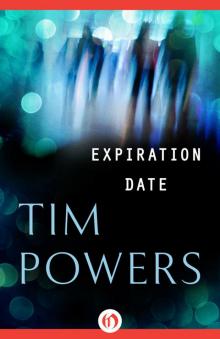 Expiration Date
Expiration Date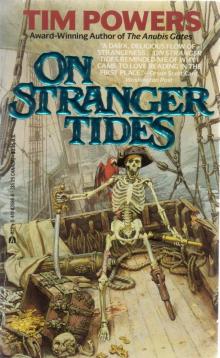 On Stranger Tides
On Stranger Tides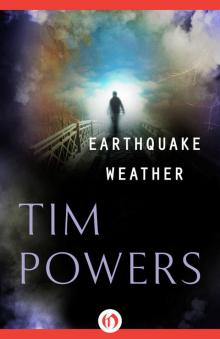 Earthquake Weather
Earthquake Weather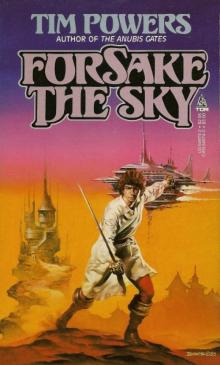 Forsake the Sky
Forsake the Sky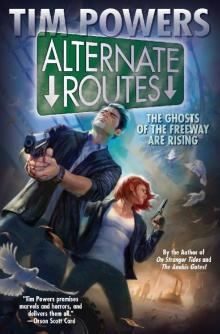 Alternate Routes
Alternate Routes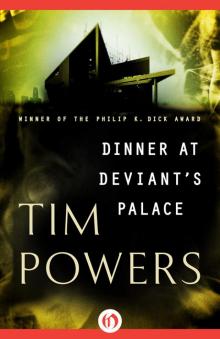 Dinner at Deviant's Palace
Dinner at Deviant's Palace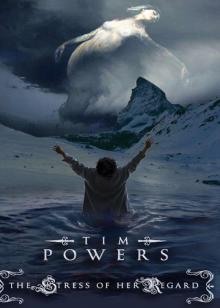 The Stress of Her Regard
The Stress of Her Regard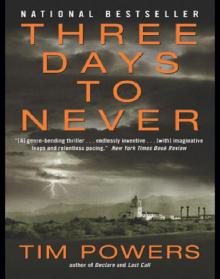 Three Days to Never: A Novel
Three Days to Never: A Novel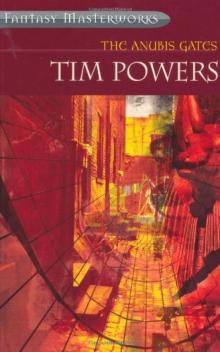 The Anubis Gates
The Anubis Gates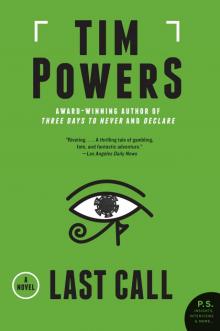 Last Call
Last Call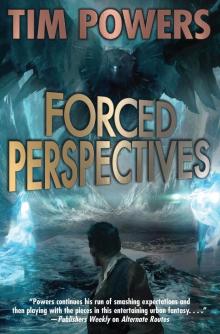 Forced Perspectives
Forced Perspectives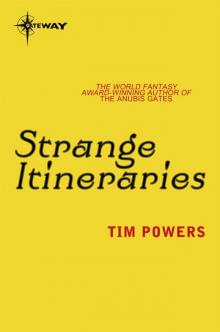 Strange Itineraries
Strange Itineraries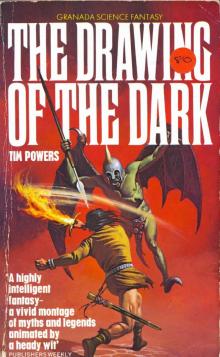 The Drawing of the Dark
The Drawing of the Dark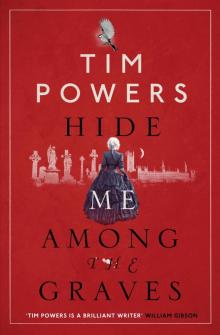 Hide Me Among the Graves
Hide Me Among the Graves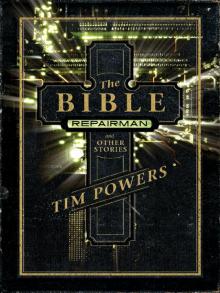 The Bible Repairman and Other Stories
The Bible Repairman and Other Stories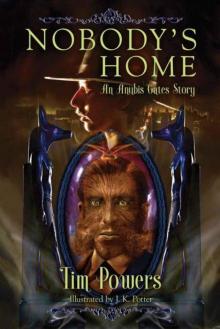 Nobody's Home: An Anubis Gates Story
Nobody's Home: An Anubis Gates Story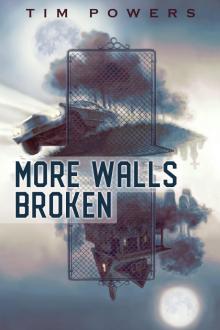 More Walls Broken
More Walls Broken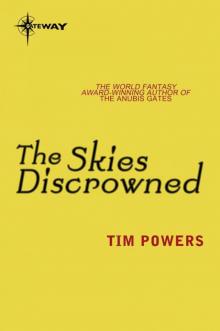 The Skies Discrowned
The Skies Discrowned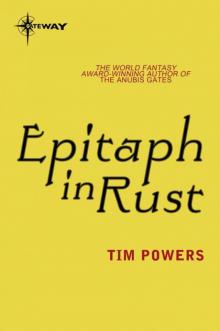 Epitaph in Rust
Epitaph in Rust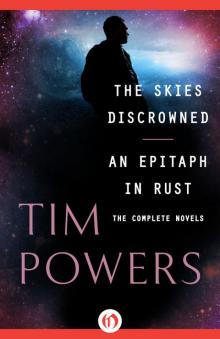 Skies Discrowned and An Epitaph in Rust
Skies Discrowned and An Epitaph in Rust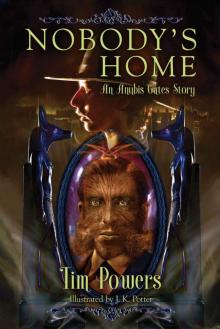 Nobody's Home
Nobody's Home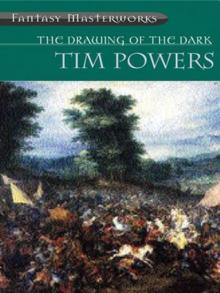 Drawing of the Dark
Drawing of the Dark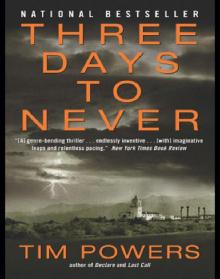 Three Days to Never
Three Days to Never